Ricky Williams reveals the emotional ‘bankruptcy’ caused by his football career… and how marijuana was the ‘trigger’ for him to step away from NFL
When Ricky Williams broke his ankle during his second NFL season with the Saints, it wasn’t just his bones that were broken.
His faith in a professional career had also diminished.
“I didn’t trust it anymore,” he now tells Mail Sport.
After a legendary career at the University of Texas, where he won the Heisman Trophy in 1998 and was subsequently selected fifth overall in the pro ranks, Williams’ “luck ran out” when it came to his body, as he now calls it.
His first preseason for a struggling New Orleans team began with a severe ankle sprain, which hampered his rookie year. The aforementioned November 2000 break cost him the rest of that sophomore season.
So it didn’t matter that he was the NFC’s leading rusher when he went down that time. Something had changed permanently in his mindset.
Ricky Williams spoke to Mail Sport this summer via Zoom in an extensive conversation
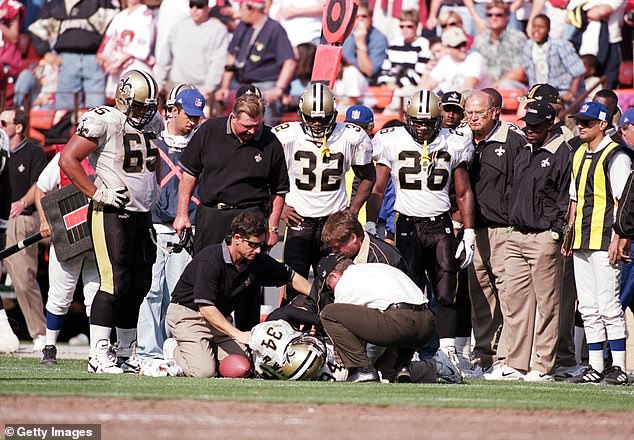
He talked about how his early injury problems in the NFL left him disillusioned with football
“That’s why I started to realize that I couldn’t give this career and this job the satisfaction that it had given me up until now,” he said in an exclusive interview. “I have to find something else.
“We see ourselves as warriors on the field, but from a broader perspective we’re more like dice at a craps table.”
In an extensive conversation, Williams spoke about his gradual disillusionment with football and how marijuana was the catalyst for his journey of self-discovery.
Williams, now 47 and gray, was not always so cynical about the sport of football, which he retired from for good in 2011.
It was a much-needed distraction when he was younger. His parents divorced when he was 6, he struggled with anger issues and his father became a registered sex offender — with ESPN’s 30 for 30 movie ‘Run Ricky Run’ He later revealed that Williams was forced to take nude photos of his father.
“Life was pretty tough, but that one time it was a reprieve… I could run and I liked to hit,” Williams says now of his youth football days. “And so it was kind of a safe place for me.”
This remained the case throughout his youth and in college, before he began to doubt his professional career.
Williams now talks about a concept called “identity shielding” and how he was conditioned from an early age to play football.
Essentially, he explains, the idea refers to the act of focusing all of your energy on thriving in a specific field, much like an aspiring actor would do as a child star.
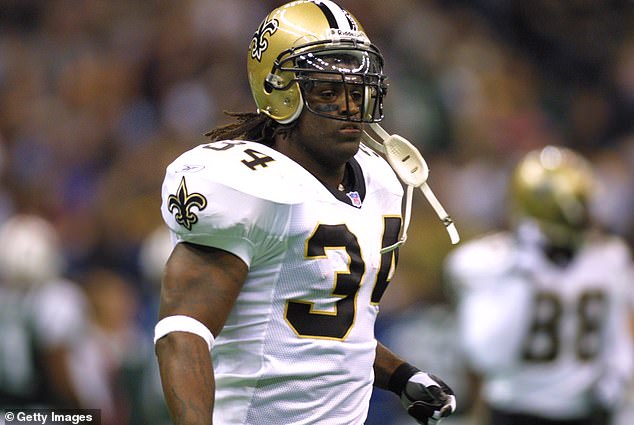
Williams said that playing in the NFL ‘kind of suck[ed’ aside from his exorbitant salary
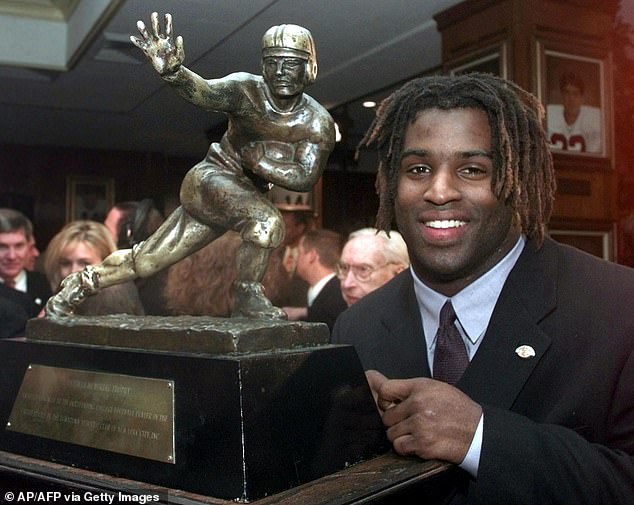
Williams was a Heisman Trophy winner in college at the University of Texas
Some people go on to have the careers they always dreamed of. Others, like Williams, realize their dreams aren’t what they wanted after all.
‘It became painfully obvious that, no, the money is great, but everything else about this job [playing football] “I find that really upsetting,” Williams said.
‘When I wasn’t playing football, I was thinking about it and imagining myself doing it. And I think that’s why I was so good… But what I paid to be good at football bankrupted me in much more important areas that I needed to have a successful and fulfilling life.’
Williams eventually reached that point — ironically, with the help of the very thing that made him a black sheep to many in the NFL.
On more than 500 occasions, as Williams would later recount Sports Illustratedhe was drug tested by the NFL.
He failed at least five of those tests for marijuana use. He failed the test a third time, which would have earned him a four-game suspension. This happened just before he decided to retire from soccer in 2004.
“People will assume that I wanted to continue playing football and that I couldn’t because I was suspended,” he says now.
Williams indicated at the time that he was basically done with playing and that he therefore did not mind if he failed a drug test.
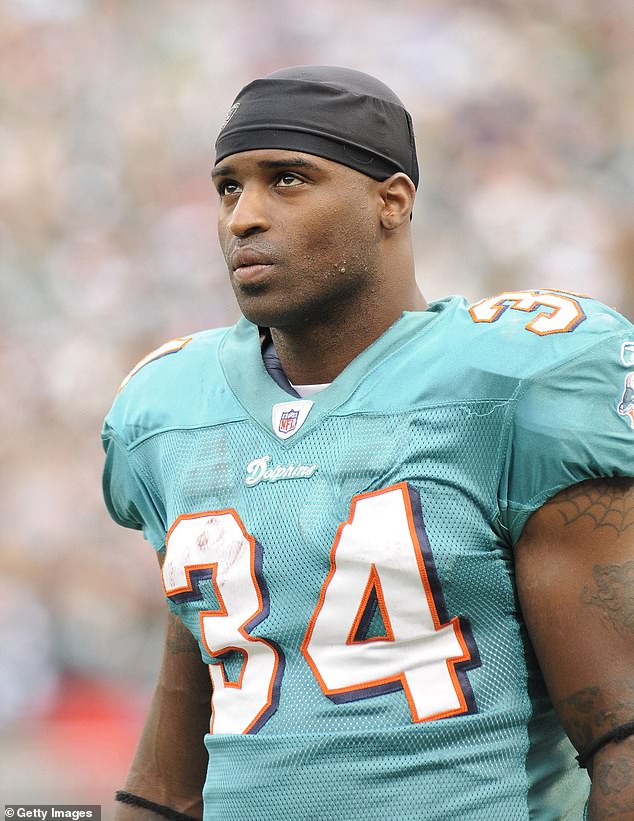
Williams retired from the NFL in 2004 while playing for the Miami Dolphins
After five years in the pros and realizing he needed to go on a journey to discover himself, he credits marijuana as the “trigger” for taking the leap to life in the NFL.
Williams sat out the entire 2004 season, studying the ancient Indian medical system known as Ayurveda, spending time at a yoga ashram in California and even venturing into a “hippie jungle paradise” in Australia as one of the Esquire reporter who had found him remembered.
Williams eventually returned to the Dolphins in 2005, but he came back with a very different perspective.
“I used to only see the end of my football career,” he says. “I couldn’t see anything of it anymore, because I had no skills. I had no skills, or real life experiences that could take me somewhere, away from football, and that bothered me. Football is a beautiful sport, but I didn’t want to do it my whole life.
“So the year in between I had the chance to interact with people who had no idea that I was a professional footballer,” he continued. “So the reflections that I got back from other people were more useful in figuring out who I am and what’s important to me. And when I came back, I had a much better idea of who I was and where I was going.
‘…Before I retired that first time, it was about everything I needed to do to fit myself into the football world. And when I came back, it was more about how can the football world help and support the things that I want to do in my life? And that change was really important for me to make.’
Although the running back was also suspended for the entire 2006 season after violating league drug abuse rules for the fourth time, his return to the field helped him realize the life vision he wanted to achieve.
Williams never considered himself an “advocate” of marijuana use when he was actively gaming.
But he certainly benefited from it, because after his retirement he played for another five seasons and proved that his earlier detour did not mean the end of his time as a top athlete.
“When you play in the NFL, you know your life is more intense than 99 percent of the other people in the world,” he said.
“So there’s just more, there’s just more stress, more things to deal with. And what I realized is, when you’re putting yourself through intense, stressful situations, the way that you relax and recover has to be just as intense.”
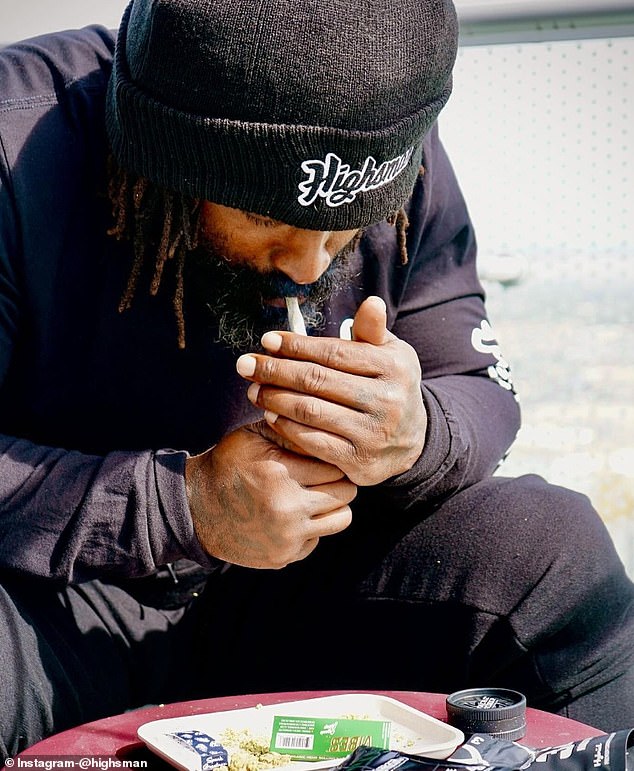
Williams launched cannabis and lifestyle brand Highsman in 2021 and has become an advocate for marijuana use
It wasn’t until after his second and final retirement that Williams really began to think about the bigger picture of his marijuana use.
He first spoke at a marijuana conference in 2015 and remembers receiving a very positive reception afterward, with people telling him he inspired them.
“My mother always said, ‘Go where you’re celebrated, not where you’re tolerated,'” he says. “And I realized that there are people who are touched by my story … and that’s when I stepped into the fire and said I need to put something out there.”
Williams reflected on the “zero support” he received during his NFL discipline troubles and decided to launch cannabis and lifestyle brand Highsman in 2021.
The brand website says it has the ambition to ‘redefine wellbeing’ and that its mission is ‘a movement of acceptance, understanding and pushing boundaries’.
Williams also spent time on Capitol Hill this spring, teaming up with former Bears Super Bowl winner Jim McMahon to advocate for looser regulations around cannabis.
Like many former players, Williams devoted himself to the sport, reporting for ESPN’s Texas-focused Longhorn Network and coaching college football for two years.
But he knew he had to do something other than football.
“It still wasn’t enough,” he said. “And I felt like I had to do something, especially with the problems I got into in the NFL around cannabis.”
Today, opinions about marijuana in competitive football have changed, perhaps in small part thanks to Williams.
Chiefs star Travis Kelce estimates that 50 to 80 percent of the league uses the drug, as he told Vanity Fair.
The effects are also being felt at the university level: in June, the NCAA removed marijuana from its list of banned substances.
“I think it’s great,” Williams said of the decision. “…I think it’s a great gesture, right?
Twenty years after a disillusioned Williams first left the NFL, he has found contentment in his life. He sees his winding journey not as one of missed opportunities or regrets, but of exploration.
“For me, it’s actually a positive story. I’ve seen so many people who have what people would call successful careers in the NFL, and now they’re doing absolutely nothing and they’re miserable,” he said.
“Everything I’ve been through, all the struggles I’ve had, I still got into the College Football Hall of Fame, I still have a statue in Texas, they still named the field after me. So if you stick to your principles and trust who you are, you’re going to be fine.”
